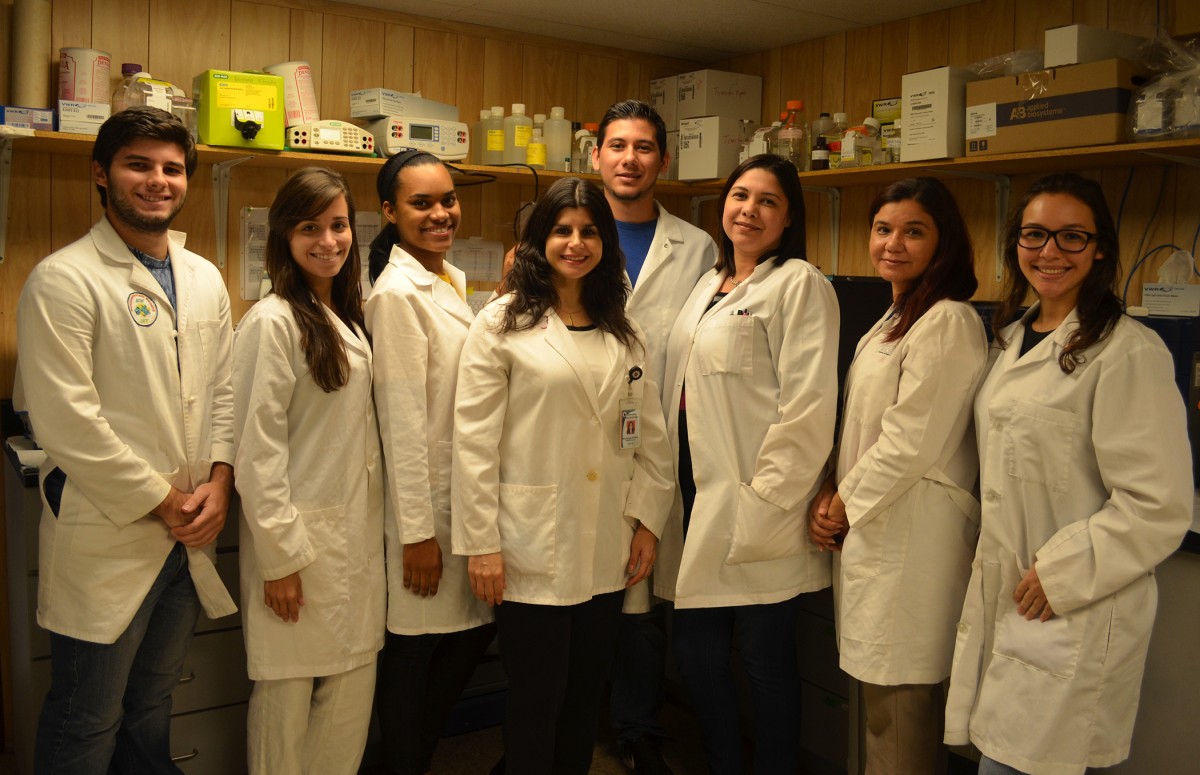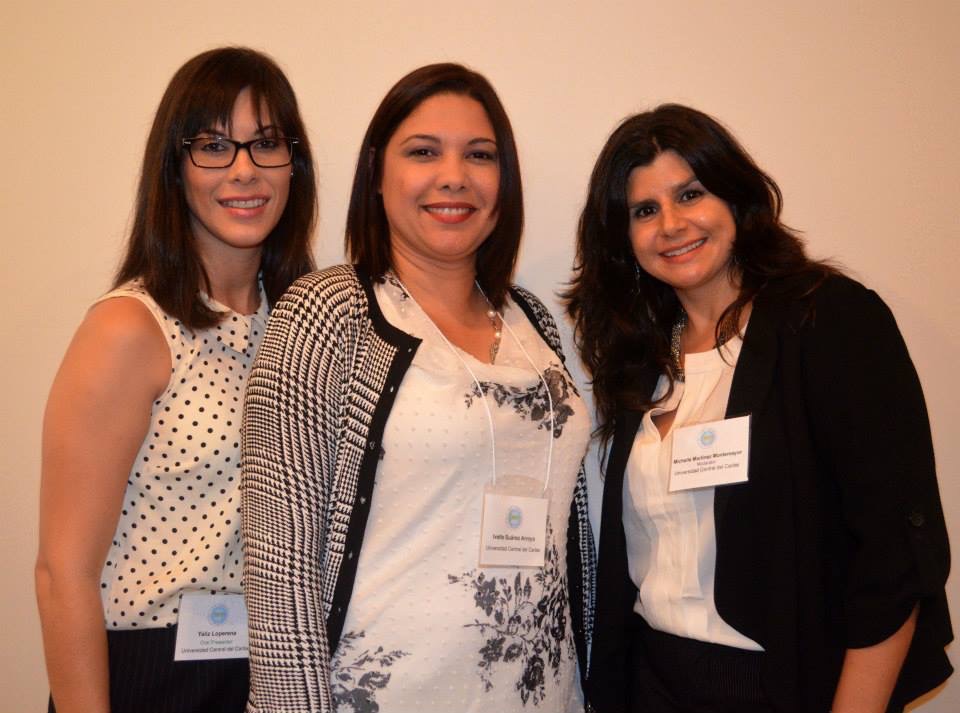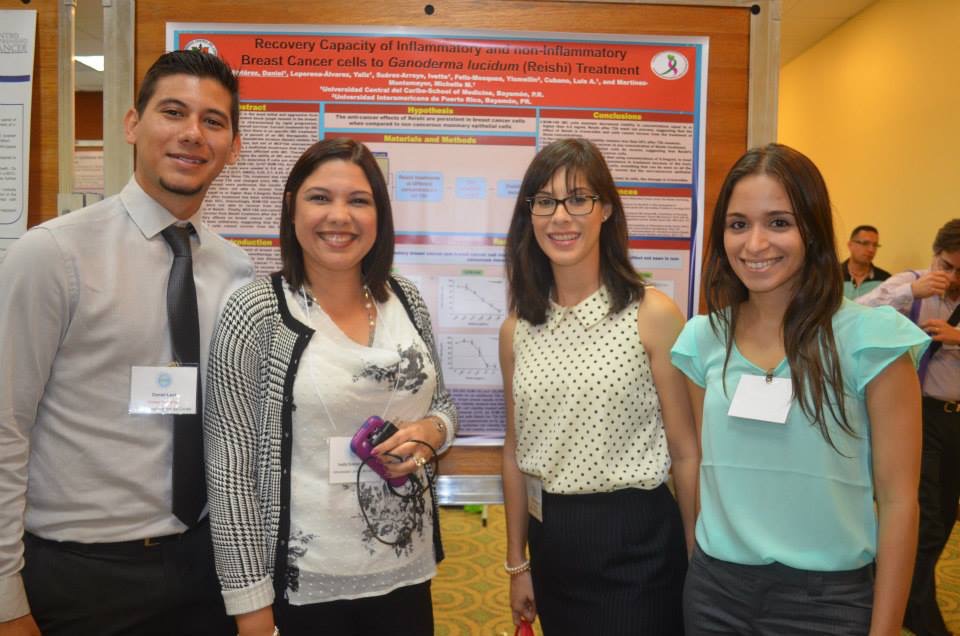Michelle Martínez Montemayor: a Borinqueña in the fight against cancer
Submitted by Reyna I. Martínez De Luna on
In the month of November, Ciencia Puerto Rico's montly story is joining the anniversary celebration of the blog Borinqueña. Use #Borinqueña to share this story.
The enthusiasm and passion that Dr. Michelle Martínez Montemayor exudes for her work, family and life can be easily felt when talking to her. Michelle is a Borinqueña from Bayamón. She was born and raised in the “City of Cowboys”, as Bayamón is also known in Puerto Rico, and today works as a professor and investigator at the Central University of the Caribbean (CUC).
Dr. Martínez Montemayor is a dedicated scientist and mentor that everyday moves a step forward in the battle against cancer. At CUC, Michelle and her research team study how the medicinal mushroom Ganoderma lucidum (Reishi) is effective for the treatment of inflammatory breast cancer (IBC). The Reishi mushroom has been used for thousands of years in traditional Chinese medicine, and Dr. Martínez Montemayor has determined that its effectiveness against cancer stems from the fact that the mushroom kills cancer cells without harming unaffected cells.

Dr. Martínez Montemayor's research group. From left to right: Andrés Gutierrez, Darlene Vargas, Yismeilin Feliz, Daniel Leal, Ivette Suárez, Mercedes Lacourt, and Tiffany Rios.
Michelle never imagined that she would become a scientist focused on studying how to stop IBC. She always thought she would become a veterinarian, but at the same time, she was also very interested in understanding how diseases arise and how genetics are linked to disease. When her application to veterinary school was denied, Michelle did not become disheartened and immediately decided to study science for two specific reasons: studying science would allow her to understand how genetics influence the diseases that afflict us and because she knew that this training would allow her to be admitted into veterinary school.
To reach her goal, Dr. Martínez Montemayor began her undergraduate education in the Natural Sciences Program at the University of Puerto Rico Bayamón (UPR-B), where she obtained an associate degree. Her constant search for knowledge took her to the University of Puerto Rico at Cayey (UPR-C), where she obtained her bachelor’s degree in biology.
In her last year of college, Michelle applied to veterinary school again, but without success. This setback, just like the first time, did not stop Michelle, who then went on to take courses in livestock sciences at the University of Puerto Rico at Mayagüez through an exchange program.
Michelle with her students Yaliz Loperena and Ivette Suárez

In an expected turn of fate, Dr. Martínez Montemayor fell in love with the livestock science courses she was taking. This led her to pursue a master’s degree in livestock sciences at the University of Rico at Mayagüez. Money then became a limiting factor in her journey to obtain her Master’s. With admirable determination, Michelle immediately sketched out a plan that allowed her to obtain funding from the company ELANCO Animal Health to finance her studies in respiratory diseases in pigs.
During her master’s degree, Michelle had the opportunity to participate in a summer research internship as part of the Developing Research Experience at Michigan State (DREAMs) Program. This internship confirmed her interest for research. After the internship, Michelle returned to UPR-M to defend her master’s thesis, but was already set on continuing doctoral studies in animal sciences.
For graduate school, Michelle applied and was accepted in a number of universities in the United States, including Michigan State where she had pursued her internship. She recounts that she decided to do her graduate work at the Michigan State because the Animal Science Department offered a track in genetics, where she could study the molecular basis of animal disease. Also, at the time that Michelle applied, the deparment had just renovated its facilities and thus provided the newest technologies and resources.
Her dissertation research consisted of studying what genes respond to the pharmacological doses of zinc that are administered to recently weaned pigs. Diet supplementation with pharmacological levels of minerals like zinc is a common practice in the swine industry because it ensure weight gain after baby pigs are separated from their mothers. With her research, Michelle successfully demonstrated that the genes altered by high doses of zinc were involved in oxidative stress and metabolism regulation.
After finishing her doctorate, Dr. Martínez Montemayor returned to Puerto Rico. Her first job in Puerto Rico was at the Chemistry Department at the University of Puerto Rico at Cayey, where she had the opportunity to organize and establish a laboratory dedicated to investigate plant natural extracts.
Decided to continue with her scientific career, Michelle went on to do a postdoc in the lab of Dr. Sandra Peña de Ortiz at the University of Puerto Rico at Río Piedras. The postdoc in Dr. Peña de Ortiz lab was short because Michelle’s training in genomics allowed her to help establish the Functional Genomics Center as Associate Director. Michelle enjoyed very much this stage of her career. As Associate Director of the Genomics core, she had the opportunity to study the function of different genes in many biological processes while she provided services to other investigators.
Michelle’s next scientific adventure took place at the Central University of the Caribbean in Bayamón, where she pursued her second postdoc in Dr. Suranganie Dharmawardhane’s laboratory. In her laboratory Michelle studied how natural compounds, like soy and red wine, promote or inhibit cancer and metastasis. Dr. Su, as she is known among her colleagues, played a very important role in Michelle’s career. She tells us “Su was my second mentor in life and the one who taught me that all women can be mothers, scientists and successful professionals”. With a family of her own, Su was and still is a prolific scientist. Through her example Michelle learned that by maintaining a work-life balance it is possible to excel at both roles.
It was at Dr. Su’s laboratory Michelle began her research with the Reishi mushroom. Su and Michelle learned from the naturopathic doctor Efraín Rodríguez Malavé that he complemented the medical treatment of his cancer patients with Reishi. Efraín was convinced that Reishi supplementation provided an improved quality of life of his cancer patients, but did not know how administration of the mushroom was able to accomplish this.
Michelle’s curiosity prompted her to study the effect of Reishi on cancer cells. In her lab Dr. Su had inflammatory cancer cells that were going to be used to study metastasis. Instead of performing these experiments, Michelle began to study if the Reishi had any effect on these inflammatory cancer cells. To her surprise, Michelle found that the mushroom had the capacity to selectively kill these cancer cells.

Currently, Michelle continues to study how the Reishi mushroom attacks and eliminates inflammatory breast cancer cells. As an assistant professor in the Biochemistry department at the CUC, Michelle is the leader of a high impact and well-funded scientific research team. Although, in between laughs, Michelle confesses that she still does not discount the possibility of going to veterinary school, she does state that she does not see herself doing anything else than being a scientist. Michelle admits that she enjoys the process of finding answers to complicated questions. For her it is also very gratifying the opportunity of training the future generations of Puerto Rican scientists on the Island. With her successful research, Michelle has brought to the CUC substantial funding for research, including a National Institutes of Health (NIH) predoctoral fellowship that was granted to her first graduate student. This fellowship was the first predoctoral fellowship received by a CUC student.
To the Borinqueñas that want to become researchers, Michelle encourages them to be persistent. “Research is a very competitive field, where success depends on obtaining funds through grants and on publishing your findings in scientific journals. To overcome all the highs and lows, you must be very passionate about your work and not take science related criticisms personal. Persistence is the key”, she comments.
Michelle is scientist Borinqueña of high caliber. With her research, she gets us closer to win the battle against cancer. If you would like to learn more about Dr. Martínez Montemayor, visit her profile at CienciaPR.








